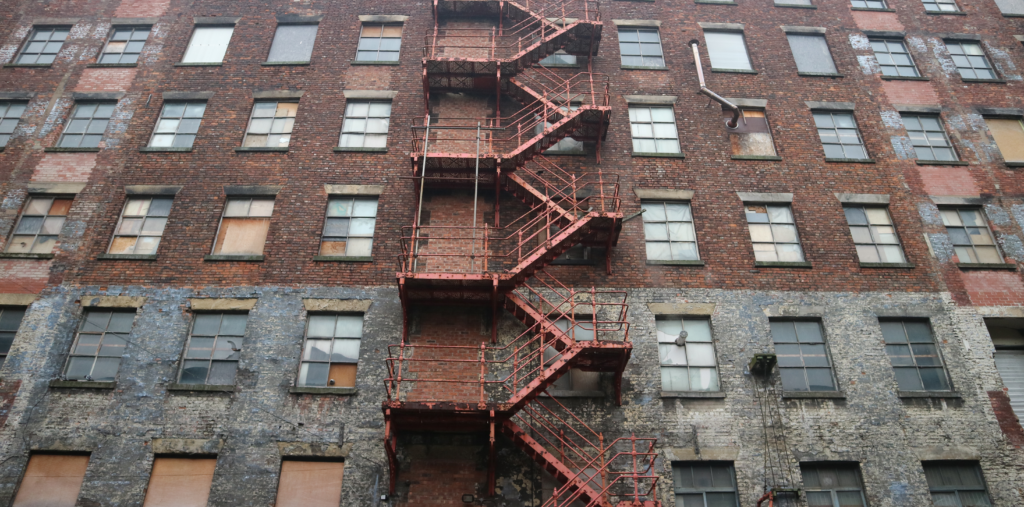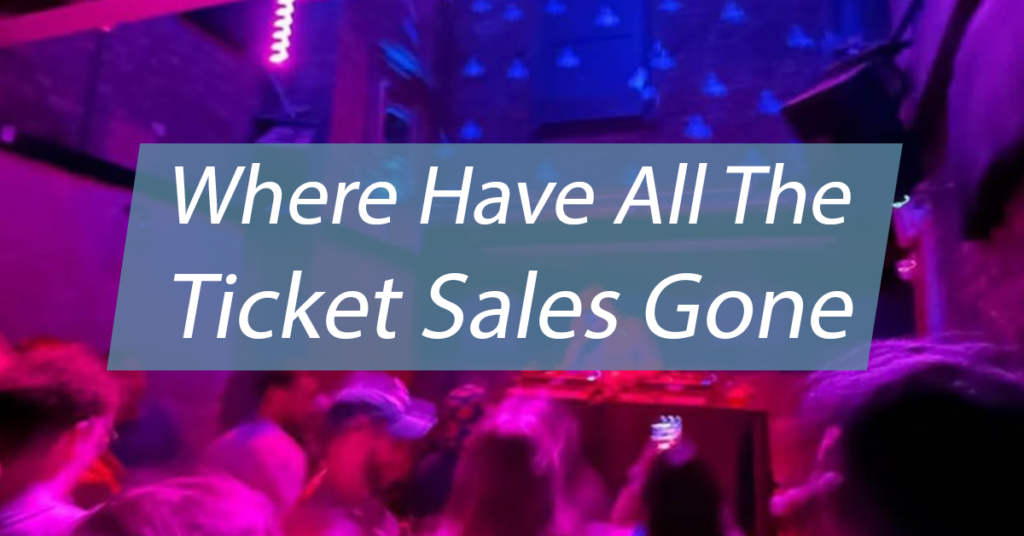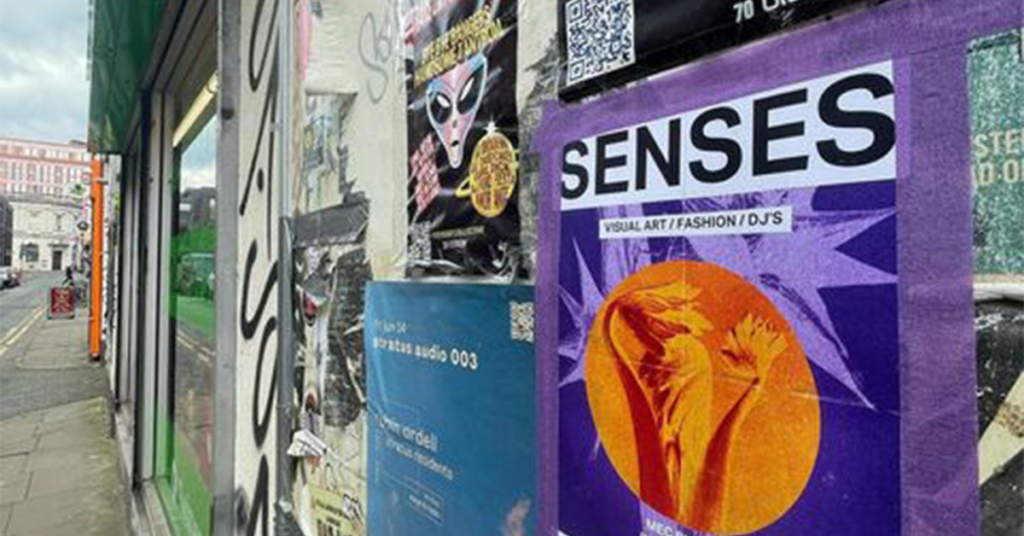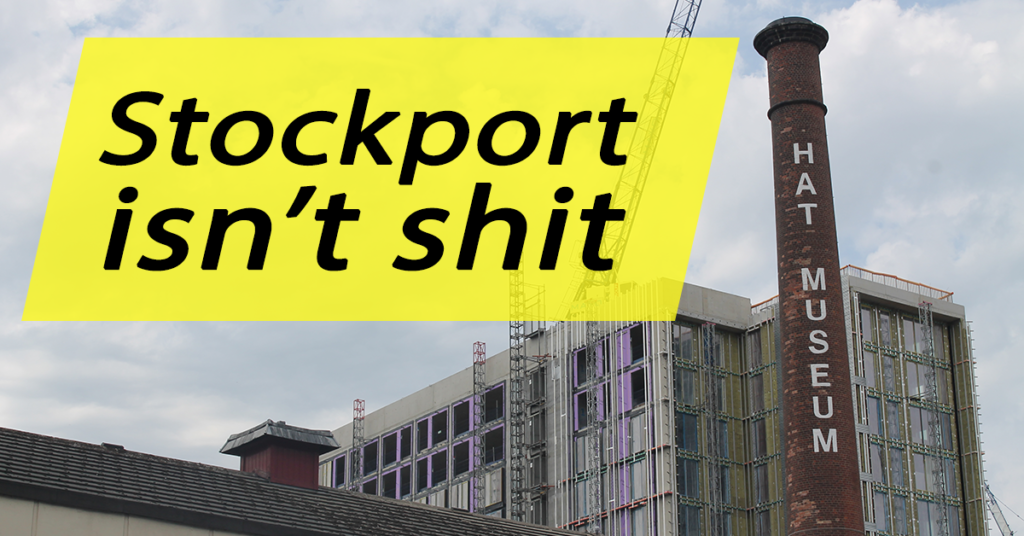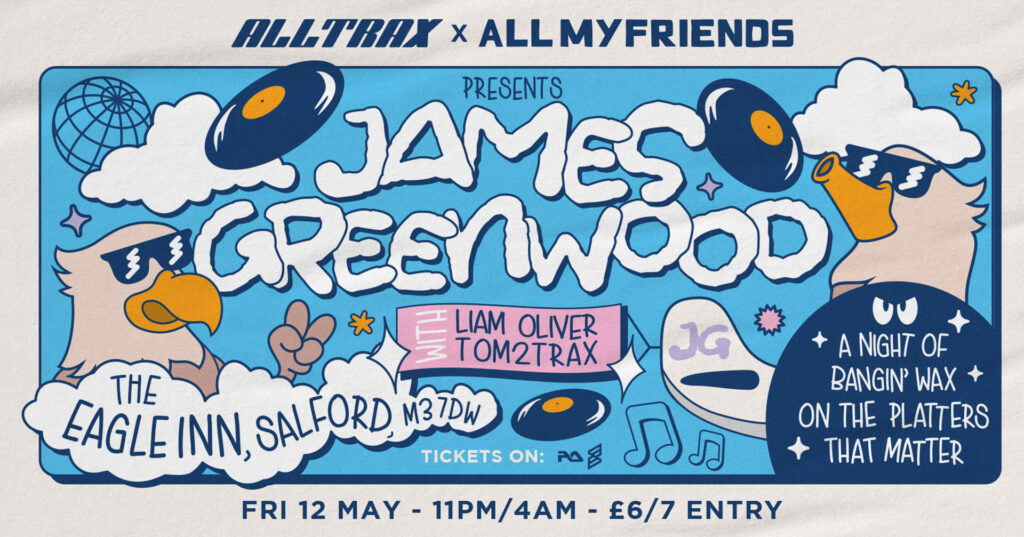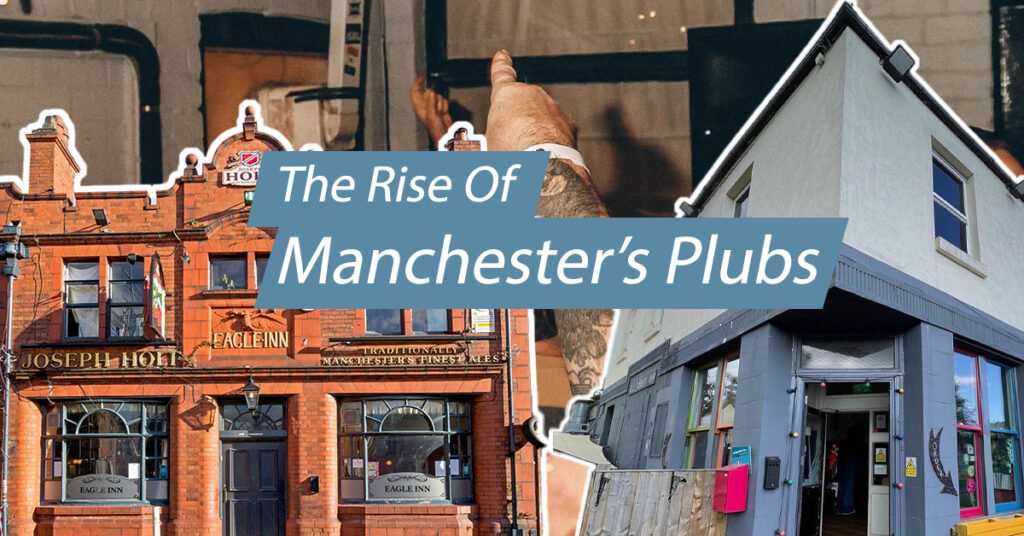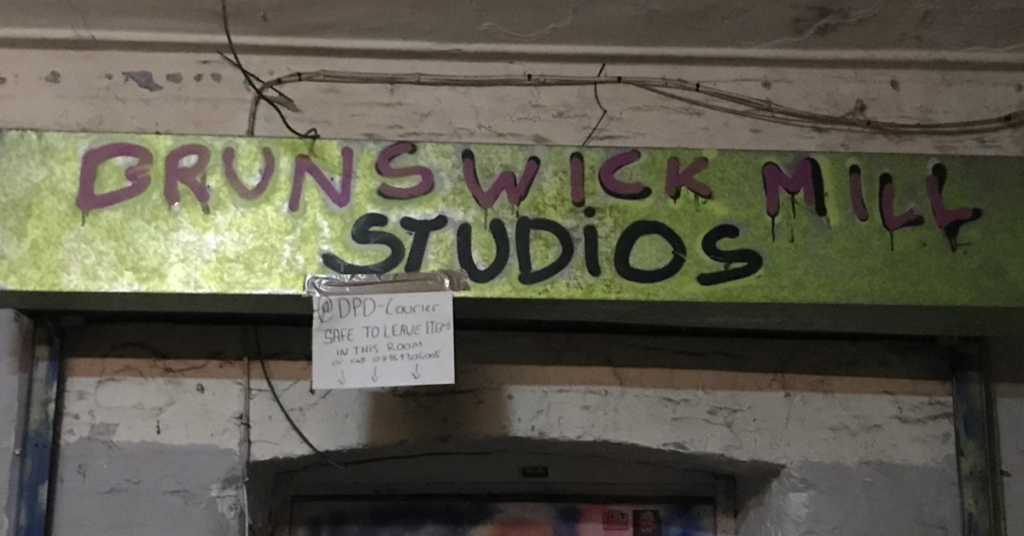
This article was written by Tom Hodgson aka Tom2Trax (You can listen to his mix for the blog here)
As I sat in a literal hole-in-the-floor in the White Hotel, my feet hanging over the ledge towards the bar, the scent of incense drifted through from the main room. As the joyous clubbers passed through into the sitting area, they took time out for a beer, to meet friends or to sit, as I was, on the benches hanging over the bar.
The rest of my group were beyond the wall of industrial rubber strips and up on the former M.O.T car platform, drenched in warm lights and taking in an atmosphere that Optimo’s JD Twitch would later describe as: ‘…as good as, exciting as and vibrant as The Hacienda ever was.’
Forget words of nostalgia, forget ‘it’s not as bad as people say it is these days’, and god forbid, forget those nuclear meltdown-esque cries of ‘all the clubs are closing down!’ The informed know that Manchester has been quietly getting on with it for the last five years, building a solid, forward-facing underground culture away from the city centre.
 When JD posted that gospel-delivering tweet, I almost read it as a backlash at long-standing comparisons with the rose-tinted haze of the late 80’s/early 90’s heyday. Whether he meant that or not, I took that interpretation and felt a gasp of relief: our city was finally getting the recognition it deserved, and without the added finger-waving of the ‘good old days’ thrown in for good back-handed measure. Yes, JD had mentioned the Hacienda – and why not, the club’s legendary status is widely accepted, and rightly so – but it felt like we were finally released from the vice of comparison. Being ‘as good as it ever was’, felt like our time was now being put up there as equally deserving and yet totally un reliant on the past.
The underground scene in Manchester has gone from strength to strength over the last few years, and what started as a brilliant foundation with Islington Mill, the Warehouse Project and Soup Kitchen, has morphed into something truly independent that shows no sign of slowing down. Hidden, the White Hotel, Partisan Collective and Eastern Bloc’s events now mean that this city is not just a place with great clubs, but a centre of underground social gathering, boundary-pushing and progressive music policies.
As the thud of some unrelenting 909 pulsated through the rubber sheets to where I was sat that night, a Glaswegian lad visiting for the weekend sat besides me and we discussed Sub-club, Jackmaster and Optimo. The dancefloor just a moment away, we clinked beers and headed back to our respective groups. That night, the White Hotel delivered, not for the 90’s, not for Nostalgia, but for now, for Manchester and for universal club culture. The 12-6am set times making the whole experience feel warm and intimate, accessible yet only ours, and a million miles away from city centre club land.
I’d felt a similar feeling a few months earlier at Partisan Collective, where Objekt was going back-to-back with Call Super, two DJ’s at the top of their game and on the cusp of modern techno production. The night was a sacred date stolen away from the duo’s rigorous tour schedules, and brought in a raft of new members to the non-for-profit club, which is community-led, democratically ran by its members and brings the original club values of Peace, Love, Unity and Respect (P.L.U.R) into 2019.
When JD posted that gospel-delivering tweet, I almost read it as a backlash at long-standing comparisons with the rose-tinted haze of the late 80’s/early 90’s heyday. Whether he meant that or not, I took that interpretation and felt a gasp of relief: our city was finally getting the recognition it deserved, and without the added finger-waving of the ‘good old days’ thrown in for good back-handed measure. Yes, JD had mentioned the Hacienda – and why not, the club’s legendary status is widely accepted, and rightly so – but it felt like we were finally released from the vice of comparison. Being ‘as good as it ever was’, felt like our time was now being put up there as equally deserving and yet totally un reliant on the past.
The underground scene in Manchester has gone from strength to strength over the last few years, and what started as a brilliant foundation with Islington Mill, the Warehouse Project and Soup Kitchen, has morphed into something truly independent that shows no sign of slowing down. Hidden, the White Hotel, Partisan Collective and Eastern Bloc’s events now mean that this city is not just a place with great clubs, but a centre of underground social gathering, boundary-pushing and progressive music policies.
As the thud of some unrelenting 909 pulsated through the rubber sheets to where I was sat that night, a Glaswegian lad visiting for the weekend sat besides me and we discussed Sub-club, Jackmaster and Optimo. The dancefloor just a moment away, we clinked beers and headed back to our respective groups. That night, the White Hotel delivered, not for the 90’s, not for Nostalgia, but for now, for Manchester and for universal club culture. The 12-6am set times making the whole experience feel warm and intimate, accessible yet only ours, and a million miles away from city centre club land.
I’d felt a similar feeling a few months earlier at Partisan Collective, where Objekt was going back-to-back with Call Super, two DJ’s at the top of their game and on the cusp of modern techno production. The night was a sacred date stolen away from the duo’s rigorous tour schedules, and brought in a raft of new members to the non-for-profit club, which is community-led, democratically ran by its members and brings the original club values of Peace, Love, Unity and Respect (P.L.U.R) into 2019.
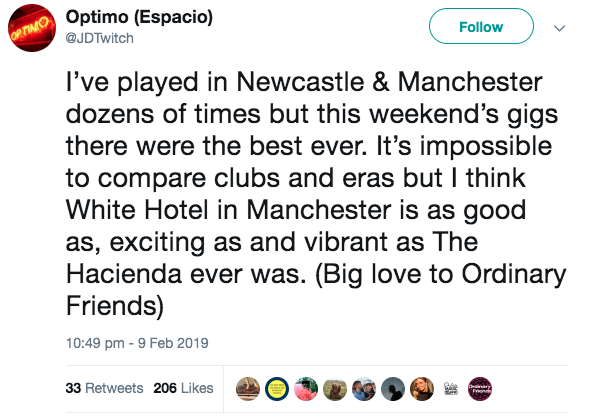 When JD posted that gospel-delivering tweet, I almost read it as a backlash at long-standing comparisons with the rose-tinted haze of the late 80’s/early 90’s heyday. Whether he meant that or not, I took that interpretation and felt a gasp of relief: our city was finally getting the recognition it deserved, and without the added finger-waving of the ‘good old days’ thrown in for good back-handed measure. Yes, JD had mentioned the Hacienda – and why not, the club’s legendary status is widely accepted, and rightly so – but it felt like we were finally released from the vice of comparison. Being ‘as good as it ever was’, felt like our time was now being put up there as equally deserving and yet totally un reliant on the past.
The underground scene in Manchester has gone from strength to strength over the last few years, and what started as a brilliant foundation with Islington Mill, the Warehouse Project and Soup Kitchen, has morphed into something truly independent that shows no sign of slowing down. Hidden, the White Hotel, Partisan Collective and Eastern Bloc’s events now mean that this city is not just a place with great clubs, but a centre of underground social gathering, boundary-pushing and progressive music policies.
As the thud of some unrelenting 909 pulsated through the rubber sheets to where I was sat that night, a Glaswegian lad visiting for the weekend sat besides me and we discussed Sub-club, Jackmaster and Optimo. The dancefloor just a moment away, we clinked beers and headed back to our respective groups. That night, the White Hotel delivered, not for the 90’s, not for Nostalgia, but for now, for Manchester and for universal club culture. The 12-6am set times making the whole experience feel warm and intimate, accessible yet only ours, and a million miles away from city centre club land.
I’d felt a similar feeling a few months earlier at Partisan Collective, where Objekt was going back-to-back with Call Super, two DJ’s at the top of their game and on the cusp of modern techno production. The night was a sacred date stolen away from the duo’s rigorous tour schedules, and brought in a raft of new members to the non-for-profit club, which is community-led, democratically ran by its members and brings the original club values of Peace, Love, Unity and Respect (P.L.U.R) into 2019.
When JD posted that gospel-delivering tweet, I almost read it as a backlash at long-standing comparisons with the rose-tinted haze of the late 80’s/early 90’s heyday. Whether he meant that or not, I took that interpretation and felt a gasp of relief: our city was finally getting the recognition it deserved, and without the added finger-waving of the ‘good old days’ thrown in for good back-handed measure. Yes, JD had mentioned the Hacienda – and why not, the club’s legendary status is widely accepted, and rightly so – but it felt like we were finally released from the vice of comparison. Being ‘as good as it ever was’, felt like our time was now being put up there as equally deserving and yet totally un reliant on the past.
The underground scene in Manchester has gone from strength to strength over the last few years, and what started as a brilliant foundation with Islington Mill, the Warehouse Project and Soup Kitchen, has morphed into something truly independent that shows no sign of slowing down. Hidden, the White Hotel, Partisan Collective and Eastern Bloc’s events now mean that this city is not just a place with great clubs, but a centre of underground social gathering, boundary-pushing and progressive music policies.
As the thud of some unrelenting 909 pulsated through the rubber sheets to where I was sat that night, a Glaswegian lad visiting for the weekend sat besides me and we discussed Sub-club, Jackmaster and Optimo. The dancefloor just a moment away, we clinked beers and headed back to our respective groups. That night, the White Hotel delivered, not for the 90’s, not for Nostalgia, but for now, for Manchester and for universal club culture. The 12-6am set times making the whole experience feel warm and intimate, accessible yet only ours, and a million miles away from city centre club land.
I’d felt a similar feeling a few months earlier at Partisan Collective, where Objekt was going back-to-back with Call Super, two DJ’s at the top of their game and on the cusp of modern techno production. The night was a sacred date stolen away from the duo’s rigorous tour schedules, and brought in a raft of new members to the non-for-profit club, which is community-led, democratically ran by its members and brings the original club values of Peace, Love, Unity and Respect (P.L.U.R) into 2019.
